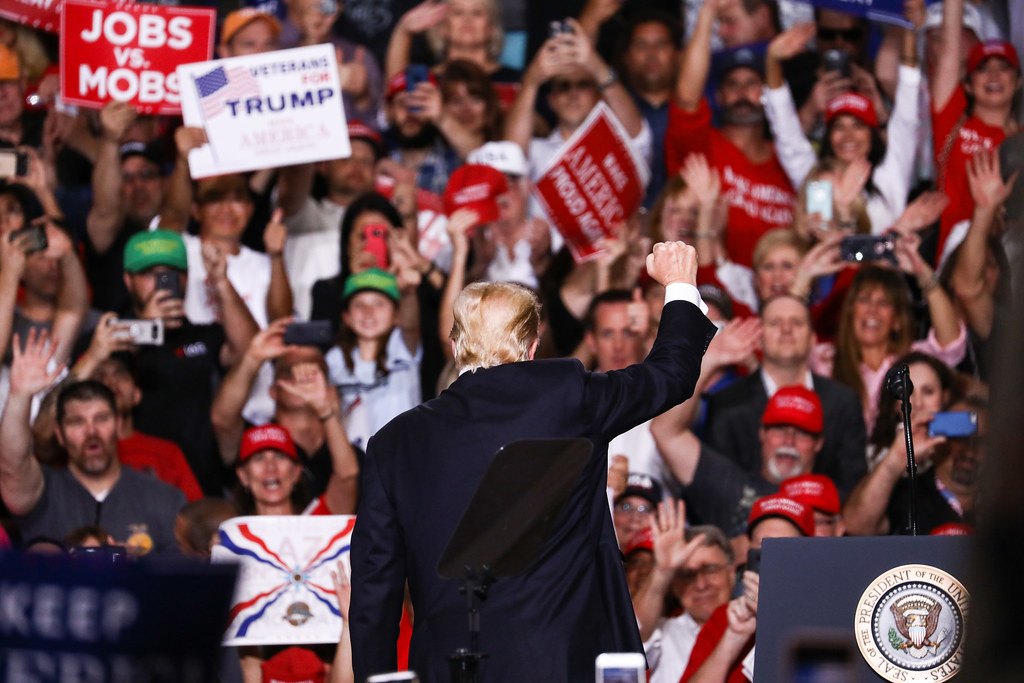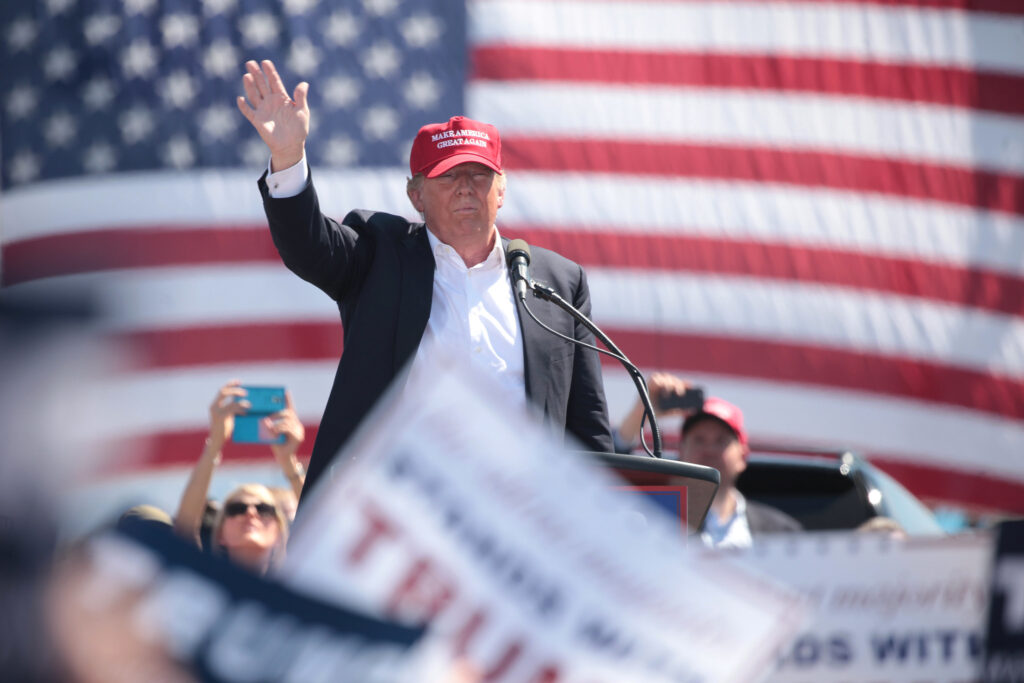A Profile of Trump Voters: The Demographics of his MAGA Enthusiasts and Their Relationship to Him

President Donald Trump at a Make America Great Again rally in Mesa, Arizona, on Oct. 19, 2018. (Charlotte Cuthbertson/The Epoch Times/Flickr/ Creative Commons)
Third of the Series “Attitudes, Concerns, and Policy Preferences of Trump Voters”
By Wayne A. Selcher, PhD* [Informe OPEU]
In the November 2024 elections, Trump is set to receive many millions of votes from party loyalists, just because he is the Republican nominee and did extraordinarily well in the party’s primary elections. The Biden-Harris administration is extremely unpopular among Republicans, and is considered a failure by much of the general public, particularly in the economic realm. Trump can count on this negative evaluation of the current administration for votes that are motivated mainly to oppose “the other side” and to seek “change” from the 2021 to 2025 Democratic administration. Even Republicans who identify most with the former Republican Party of a more traditionally conservative yet compromise-accepting nature that Trump swept aside are quite likely (but not certain) to vote for him, despite personal reservations about him. There are millions in the highly polarized country, with strongly negative (largely oppositional) partisanship, who believe that “any Republican is better than any Democrat,” and especially a Democrat with the liberal record of Kamala Harris.
Trump’s Base of Loyal Followers
However, Trump also has millions of loyal followers who fully support and vigorously encourage his populist, unconventional, and combative style precisely because he has supplanted the former party leaders that they saw as too accommodationist and too accepting of the pre-2016 national status-quo. A 2022 study publicized by the University of California at Davis’s Violence Prevention Research Program, done by Wintermute, et al, for one example, defined MAGA (“Make America Great Again”) Republicans as “self-identified Republicans who voted for Donald Trump in 2020 and agreed strongly or very strongly with the statement that ‘the 2020 election was stolen from Donald Trump, and Joe Biden is an illegitimate president’… MAGA Republicans, as defined, are estimated to account for 33.6% of all Republicans and 15.0% of the adult population of the US.” It is this segment of Trump voters, the enthusiasts, the MAGA subset within the Republican Party, those who believe in Trump’s often-repeated “stolen election” grievance myth, that we will examine here, regarding their demographic and related characteristics and their interactions concerning Trump.
 (Archive) Signs at a campaign rally for Donald Trump at the Prescott Valley Event Center in Prescott Valley, Arizona, October 4th, 2016 (Credit: Gage Skidmore/Flickr)
(Archive) Signs at a campaign rally for Donald Trump at the Prescott Valley Event Center in Prescott Valley, Arizona, October 4th, 2016 (Credit: Gage Skidmore/Flickr)
It is a central belief of MAGA adherents that so much is at stake now, the condition and direction of the country so dire, that a continuation of politics as usual (and maybe even of democracy itself) will not “save” America or make the country “great again.” This large base is the group that Trump explicitly appeals to in his speeches, rallies, and behaviors, even though the average general election voter may not share many of his policy positions or appreciate his narcissism, vanity, and often unconventional style and speech. In a symbiotic spiral, Trump and his followers mutually reinforce each other. Trump replays his favorite lines in customarily long speeches at rallies and picks up on the flow of the latest right-wing media posts to inject new conspiracy theories, accusatory claims with little or no factual basis, slogans, derogatory nicknames, petty insults and slurs, and issues into his message and delivery style as the weeks go by.
His well-chosen slogans resonant with them: [A Clear Victory] “Too Big to Rig,” “Swamp the Vote,” “Drill, Baby Drill” [pro-oil and gas exploration], “No Tax on Tips,” “Never Surrender,” and “Make America Greater than Ever Before.” In turn, he obviously revels in the size, approval, and energy of the crowds at his events. Well-practiced through years in TV show business and business marketing, he is sensitive to any disparagement of the size and passion of his crowds. Those aspects of his campaign are vital to bolstering his own self-image and to projection of the image of being a “strong leader,” the defiant and daring “man for the moment,” adored by millions who see him as the savior of the country.
The characteristics of MAGA believers have been documented over the recent years in many polls and analyses by the Pew Research Center, Gallup, Morning Consult, AP-NORC, YouGov, The Economist, Washington Post, New York Times, Fox News, PolitiFact, and the Public Religion Research Institute, as well as in many academic studies, all of which are the basis for identifying the summary characteristics below. Trump’s enthusiastic supporters come from all social segments and places, and are diverse. But group tendencies can be identified, in terms of greater or lesser numbers and percentages relative to mainstream Republicans or conservatives, but not as absolutes or in individual cases.
In their majority they tend to be white, male, and mainly older, are highly conservative, support traditional values such as religion and proud patriotism, are less likely to have a college degree, are more likely to be rural or small town-based and lower-income, are highly conscientious and disciplined (focused), and are intensely loyal to Trump (personalistically) more so than to the Republican Party (institutionally). Their favorite issues include gun rights, anti-abortion (pro-life), strengthening the police, ending discrimination against whites and Christians, stopping illegal immigration, and adopting foreign trade protectionism for American industries. Many of them feel a resentment at being left behind or marginalized by broad social and economic changes, such as the declining percentage of whites in the population, massive illegal immigration from developing countries, decline of religious belief, globalization, incomes falling behind the cost of living, and the change from a manufacturing and mining economy of physical labor to a service and knowledge-oriented one that favors more educated urban residents.
 (Archive) Supporters of Donald Trump at a campaign rally at the Phoenix Convention Center in Phoenix, Arizona, 29 October 2016 (Credit: Gage Skidmore/Wikimedia Commons)
(Archive) Supporters of Donald Trump at a campaign rally at the Phoenix Convention Center in Phoenix, Arizona, 29 October 2016 (Credit: Gage Skidmore/Wikimedia Commons)
MAGA believers are more likely than the Republican norm to belong to evangelical denominations, despise the mainline mass media and its “facts,” and be open to accepting conspiracy theories about the forces opposing them. Such theories include the origins of and governmental response to Covid-19 and the QAnon conspiracy theory, which Trump has embraced. They are fully convinced of the rectitude of their views, show more authoritarian traits, prefer a “strong leader,” and are far less inclined to compromise with the Democrats than are other Republicans. They believe that the established political institutions and mass media ignore them or are deliberately set up to disparage and disadvantage them, which is a partial explanation for Trump’s continual reference to “rigged” institutions and the necessity for him to massively overhaul them. The institutions he regularly attacks include the election system, the courts, the Department of Justice, and the Federal Bureau of Investigation (FBI), all of which frustrate him because they have been used to hold him accountable for his actions.
His fans are more likely than most others on the political right to see violence and threats as acceptable to advance their cause, to “set things right,” because of the extreme danger in which they see the country, and to foresee the possibility of civil war in the country, between the forces of “good and evil.” However, Wintermute, et al concluded in the study cited above that “Despite increased endorsement of political violence, MAGA Republicans are not more willing than others to engage in violence themselves…”
But Why?
At first glance, it may be puzzling to an outsider how such an arrogant, highly self-interested multi-billionaire from New York City with global business interests, several mansions, and a private jet airliner, now 78 years of age, who totally ignored such persons and places until he wanted their votes, could be seen as their champion and national savior and develop a cult of personality with them as a fellow “victim.” As he said at a rally in Georgia in December 2020, among many accusations about fraud in the November 2020 election results in that state, “We’re all victims. Everybody here — all these thousands of people here tonight. They’re all victims, every one of you.” Simply put, he was the only national figure in 2016 to reach out to them, to sense, tap into, and mirror their concerns, and to speak plainly and loudly in a simple shared language and posture of grievance and anger to which they could relate closely, as if he were one of them and not a “regular” politician.
Trump represented a sharp and welcome break from the stagnant status quo and empty political discourse that they had come to detest. In him they found a voice and a leader, and through them he found the foundation for a path to the presidency. His supporters’ comments in interviews are often that “He talks like we do; he is not politically correct; he tells it like it is; he speaks his mind; he hates the people we hate,” all of which they interpret as truthfulness and honesty. Thus, they are totally unconcerned about the thousands of “lies” and “unfounded rumors” that the mainstream media attributes to him. These assertions are instead often featured as insightful and true revelations on the Trumpist and right-wing media, alternative facts that “dare to challenge” the standard interpretations and worldview and to center on admiration for Trump and his brand.
This treatment is especially common with talking points that have emotional weight on the right, such as the supposed connection between illegal immigration and violent crime or Democratic election fraud, in spite of the threats that often follow such dubious stories that identify specific persons or places as worthy of scorn. Trump’s great skill in using social media in tendentious ways (including sharing provocative or vulgar reposts) helps to cement emotional ties between him and his MAGA followers, however disagreeable those comments may be to a more general audience. There is an informal “online industry” of what is loosely termed “MAGA World” that amplifies his messages, defends him, and provides or amplifies new material, conspiratorial explanations, memes, and slogans for the movement (and often, not incidentally, makes money from his fans in the process).
According to his base, Trump can do and has done no wrong and is an unjustly maligned symbol of patriotism, a martyr, aspects that his merchandise and vote marketing campaign plays up, including with an online Trump Store. For example, many MAGA adherents blame the leftist Antifa movement for the January 6, 2021 riot at the US Capitol, and totally absolve Trump, despite absolutely no evidence supporting that interpretation and a mountain of evidence to the contrary. As a result, Trump has made his revisionist interpretation of that day a major part of his current election campaign rallies, protesting his own innocence and shifting blame to others, as he so commonly does when facing accusations about his conduct or speech. For him and them, his many legal issues and two impeachments are all “fake” charges, a “witch hunt,” set up by the Democrats just to keep him out of power.
The enthusiasts accept the tight leader-follower psychological connection implied by Trump’s defiant statement after his June 2023 federal indictment on charges of illegally retaining classified government documents after leaving office: “In the end, they’re not coming after me. They’re coming after you– and I’m just standing in their way.” His defiant spirit after surviving two assassination attempts (July 13 and September 15, 2024) further solidified his image within MAGA as a tenacious “fighter” who is taking risks for the cause, a point that he brings up in rallies.
Affirmation and praise for America’s traditional religious roots has become a vital part of Trump’s appeal to conservatives. In February 2024 at a national religious broadcasters convention, Trump declared himself to be a “very proud Christian” (although there is no apparent evidence that he practices that faith), and pledged to end discrimination against Christians by the “radical left,” a principal concern of MAGA believers. Prayers are often offered, usually by evangelical religious leaders, at the start of his rallies, before Trump’s appearance, consistently portraying him as a righteous man who will lead America back to God, and that only in that spiritual condition can America be “great again.”
 (Archive) MAGA: Donald Trump speaking with supporters at a campaign rally at Fountain Park in Fountain Hills, Arizona, March 19th, 2016 (Credit: Gage Skidmore/Flickr)
(Archive) MAGA: Donald Trump speaking with supporters at a campaign rally at Fountain Park in Fountain Hills, Arizona, March 19th, 2016 (Credit: Gage Skidmore/Flickr)
Journalist McKay Coppins analyzed the full content of 58 such prayers at Trump rallies from November 2022 to June 2024, over 17,000 words, and sought interpretation from Christian faith leaders. One of the most common themes is that “America, like ancient Israel before it, has broken its special covenant with God and is suffering the consequences.” Coppins notes that “What’s new is how many Christians now seem convinced that God has anointed a specific leader who, like those prophets of old, is prepared to defeat the forces of evil and redeem the country. And that leader is [Trump] running for president.” Among the national iniquities or sins alluded to in these prayers are social and cultural changes favored by liberals, such as redefinitions of gender and family. To those holding this belief that American politics is an existential spiritual battle, Trump is a righteous prophet and an instrument of God’s will. Therefore, opposition to Trump is tantamount to opposition to God’s plan, which greatly raises the stakes that they see in the November 2024 election. They are likely be highly distressed and agitated about the national future if Trump is not victorious in that election.
Implications of the Cult of Personality
MAGA enthusiasts defend Trump fiercely as if part of their own personal identity, sometimes even with physical threats to those seen as corruptly and unjustly blocking his return to power in January 2025, including judges, public officials, and election officials and workers. An early 2024 survey by the Brennan Center for Justice found that, among local election officials, “38% report experiencing ‘threats, harassment or abuse’ and 54% are concerned about the safety of their colleagues” and that “62% of local election officials are concerned about political leaders’ attempting to interfere with how they do their jobs.” Threats to such persons come mainly from the most extreme Trump supporters, but some do come from the left. All are a major concern for the security and safety of the November 2024 elections and their follow-up, particularly if Trump loses. He continually casts doubt on the fairness and trustworthiness of the American electoral process, even before 2016, and calls the legal charges against him mere “election interference” by biased judicial officials sympathetic to the Democrats or by the Biden administration itself. His enthusiasts are suspicious about and distrustful of existing political and governmental institutions, follow his lead fully, and angrily share those concerns and Trump’s contention that he won the 2020 presidential election.
On September 7, 2024, Trump posted this ominous threat, implicitly against his opponents and current election officials, on Truth Social (his own social media site):
“The 2024 Election, where Votes have just started being cast, will be under the closest professional scrutiny and, WHEN I WIN, those people that CHEATED will be prosecuted to the fullest extent of the Law, which will include long term prison sentences so that this Depravity of Justice does not happen again… Please beware that this legal exposure extends to Lawyers, Political Operatives, Donors, Illegal Voters, & Corrupt Election Officials. Those involved in unscrupulous behavior will be sought out, caught, and prosecuted at levels, unfortunately, never seen before in our Country.”
This broad warning is not a value-neutral, objective pro-election integrity, rule-of-law-type accusation and promise, nor is it in tune with any normal American election campaign rhetoric. There have been exceedingly few legally credible instances of election fraud, but MAGA adherents claim that it is rampant and totally biased against Trump and his allies, in elections that are not free and fair because the Democrats cheat. Such highly self-interested punitive challenges (of which there will be more), Trump’s numerous open threats to use the government for personal revenge if he wins (almost an obsession), and the low likelihood of his accepting an electoral loss in 2024, in the context of a very tight race, represent a stark break with American electoral tradition. This behavior is clearly distinct from the Anglo-American classical conservative belief system, which valued institutions, social order, rule of law, morality, and respect for norms and traditions, and was suspicious of demagoguery and the passions of the masses. As former Republican Representative Liz Cheney of Wyoming observed, with many others, Trump is not a conservative and is the anthesis of the Republican icon, former President Ronald Reagan.
 (Archive) Former Rep. Liz Cheney (Photo by Washington Speakers Bureau)
(Archive) Former Rep. Liz Cheney (Photo by Washington Speakers Bureau)
It is distressing to note that practically no current Republican officials at any level have spoken out to condemn such extremist rhetoric against democratic institutions and established norms as Trump freely employs. It is difficult to be sure whether this reticence is because of their agreement, party loyalty to the top candidate, not taking the threats at face value, or timidity in the face of Trump’s predictable bullying style against his opposition. In the next installment of this series on Trump voters, we will consider the severe challenges that norm-breaking Trump and his devoted, highly personalistic, semi-charismatic MAGA movement present for the 2024 elections and for American democracy, in the worrisome context of negative trends within America’s political culture.
More from this author at OPEU
Informe OPEU “A Profile of Trump Voters: Values and Policy Preferences”, 8/23/24 [Portuguese version coming soon]
Informe OPEU “The Appeal of Donald J. Trump”, 6/24/24
Book review “Eric Hoffer’s ‘The True Believer: Thoughts on the Nature of Mass Movements’”, 3/11/24 [Portuguese version available here, translated by Andressa Mendes, PhD candidate at San Tiago Dantas International Relations Program (Unesp, Unicamp, PUC-SP), Brazil]
Estudos e Análises “American Political Culture in Transition: The Erosion of Consensus and Democratic Norms”, 2/29/24 [Portuguese version coming soon]
Estudos e Análises “Is the United States ‘Exceptional’?”, 8/3/21 [Portuguese version coming soon]
Publicity “Virtual Library: The Ultimate Online Research Guide”, 4/26/21
Informe OPEU “Suggested Cost-Free Online Sources for U.S. Politics and Foreign Policy”, 6/2/21
* Wayne A. Selcher, PhD, is Professor of International Studies Emeritus, Department of Political Science, Elizabethtown College, PA, USA, and a regular contributor to OPEU. His major academic interests are Comparative Politics, American society and politics in comparative context, American Foreign Policy, Latin American Politics and Foreign Policy (especially Brazil), and Internet use in international studies teaching and research. He is the creator and editor of the WWW Virtual Library: International Affairs Resources, a web guide for online international studies research in many topics. E-mail: wayneselcher@comcast.net.
** Final review and edit: Tatiana Teixeira. First version received in September 16th, 2024. This content does not necessarily reflect the opinion of OPEU, or INCT-INEU.
*** About OPEU, or to contribute articles, contact editor Tatiana Teixeira. E-mail: tatianat19@hotmail.com. About our Newsletters, for press service, or other matters, contact Tatiana Carlotti. E-mail: tcarlotti@gmail.com.
Subscribe to our Newsletter and receive OPEU content by email.
Follow OPEU on Instagram, Twitter, Linkedin and Facebook and follow our daily posts.
Comment, share, send suggestions, be part of our community.
We are a unique Brazilian research observatory on the United States,
with weekly, free, non-profit content.





















